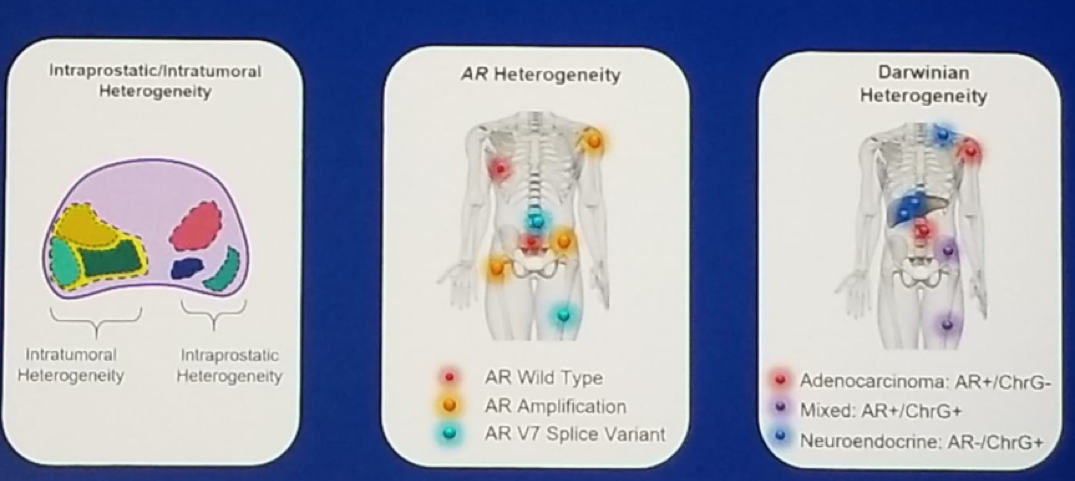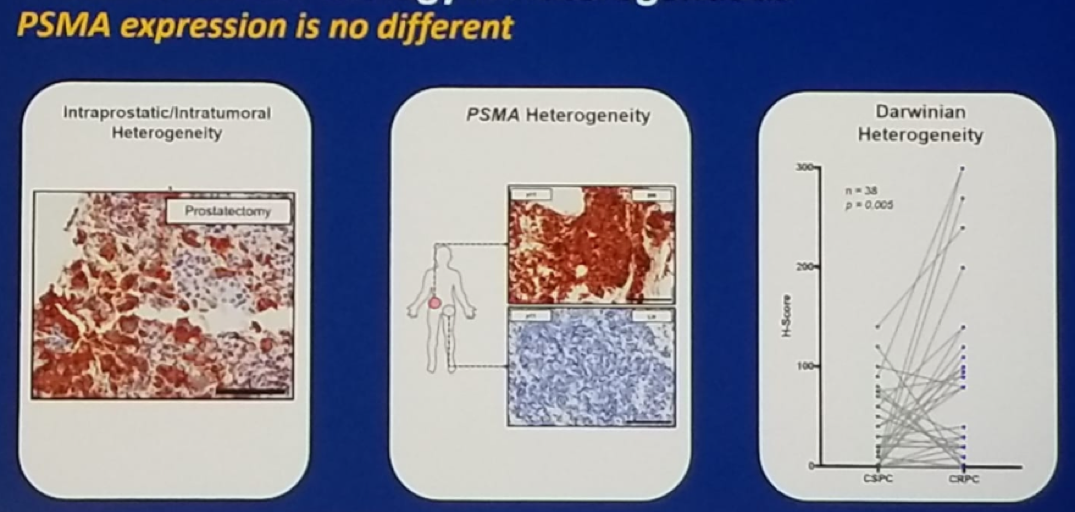- Abstract 5000 - Impact of darolutamide (DARO) on pain and quality of life (QoL) in patients (Pts) with nonmetastatic castrate-resistant prostate cancer (nmCRPC)
- Abstract 5001 - Interest of short hormonotherapy (HT) associated with radiotherapy (RT) as salvage treatment for metastatic-free survival (MFS) after radical prostatectomy (RP): Update at nine years of the GETUG-AFU 16 phase III randomized trial
- Abstract 5002 - PSMA heterogeneity and DNA repair defects in prostate cancer.
The ARAMIS trial, presented in abstract 5000, compared Darolutamide with androgen deprivation therapy (ADT) to placebo with ADT in non-metastatic castrate-resistant prostate cancer (nmCRPC) patients. In this study, the quantity of life was improved with metastasis-free survival (MFS) of 40.4 vs. 18.4 months, and a hazard ration of 0.41, p<0.001, favoring the Darolutamide arm. Additionally, the PSA progression and progression-free survival (PFS) also improved.
Additionally, the quality of life was improved in this trial as well, with pain progression of 40.3 vs. 25.4 months, with a hazard ratio of 0.65, p<0.001, favoring the Darolutamide + ADT arm. The quality of life was improved as well (using the EORTC-QLQ-PR25 questionnaire), with a hazard ratio of 0.64, p<0.01 for urinary symptoms, and a hazard ratio of 0.78, p<0.01 for bowel symptoms.
Moving on, Dr. Spratt discussed abstract 5001, which demonstrated the updated 9-year results of the GETUF-AFU 16 study, comparing radiotherapy with short ADT to radiotherapy alone in patients with biochemical recurrence after radical prostatectomy. In this study, the biochemical control was improved (due to testosterone suppression, and this will always improve biochemical control). The MFS was improved as well in the radiotherapy with short ADT arm, with a hazards ratio of 0.73 (95% CI 0.54-0.98). However, the overall survival was not improved in this study, with a hazards ratio of 0.93 (95% CI 0.63-1.39).
Dr. Spratt continued, stating that pre-salvage radiotherapy PSA was a predictive biomarker for ADT benefit. Therefore, he encourages the authors of GETUG-AFU 16 to report the MFS outcomes by PSA, as done in their previous publication.1
However, according to Dr. Spratt, the “elephant in the room” is molecular imaging which helps us better diagnose the location of recurrences and metastases in CRPC and castrate-sensitive prostate cancer (CSPC). However, even after PSMA-PET directed therapy, most patients still have disease progression. The reason for this is that prostate cancer is a heterogeneous disease, with intraprostatic/intratumoral heterogeneity, androgen receptor heterogeneity, and Darwinian heterogeneity (Figure 1). Therefore, PSMA expression should not be any different, and its expression has been shown to vary between patients and even within the same patient, as abstract 5002 so elegantly demonstrated (Figure 2).
Figure 1 – Prostate cancer heterogenous biology:

Figure 2 – PSMA expression heterogeneity in prostate cancer:

Dr. Spratt concluded his talk by stating that PSMA-PET does not recognize all disease. According to him, it is unlikely to be the “magic bullet” to cure all patients of all disease alone. However, it is not necessary to see all the disease or even to treat all the disease, in order to provide clinical benefit.
Presented by: Daniel Spratt, MD, Associate Professor, Laurie Snow Research Professor of Radiation Oncology, Associate Chair, Clinical Research, Chair, Genitourinary Clinical Research, Director, Spine Oncology Program, Rogel Cancer Center, University of Michigan, Ann Arbor, MI
Written by: Hanan Goldberg, MD, Urologic Oncology Fellow (SUO), University of Toronto, Princess Margaret Cancer Centre @GoldbergHanan at the 2019 ASCO Annual Meeting #ASCO19, May 31- June 4, 2019, Chicago, IL USA
References:
- Carrie C. et al. "Salvage radiotherapy for patients with rising PSA." Lancet Oncology. 2016. DOI:https://doi.org/10.1016/S1470-2045(16)30296-0


